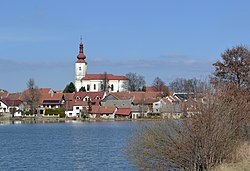Bohdalov (German: Bochdalau) is a market town in Žďár nad Sázavou District in the Vysočina Region of the Czech Republic. It has about 1,200 inhabitants.
Bohdalov | |
|---|---|
 View towards the Church of Saint Lawrence | |
| Coordinates: 49°28′45″N 15°52′33″E / 49.47917°N 15.87583°E | |
| Country | |
| Region | Vysočina |
| District | Žďár nad Sázavou |
| First mentioned | 1349 |
| Area | |
• Total | 16.06 km2 (6.20 sq mi) |
| Elevation | 570 m (1,870 ft) |
| Population (2024-01-01)[1] | |
• Total | 1,180 |
| • Density | 73/km2 (190/sq mi) |
| Time zone | UTC+1 (CET) |
| • Summer (DST) | UTC+2 (CEST) |
| Postal code | 592 13 |
| Website | www |
Administrative parts
editThe village of Chroustov is an administrative part of Bohdalov.
Geography
editBohdalov is located about 10 kilometres (6 mi) southwest of Žďár nad Sázavou and 22 km (14 mi) northeast of Jihlava. It lies in the Křižanov Highlands. The highest point is at 705 m (2,313 ft) above sea level. The stream of Bohdalovský potok flows through the market town. The territory is rich in fishponds.
History
editThe first written mention of Bohdalov is from 1349, when it was already a market town. The settlement was probably founded in the first half of the 13th century.[2]
Demographics
edit
|
|
| ||||||||||||||||||||||||||||||||||||||||||||||||||||||
| Source: Censuses[3][4] | ||||||||||||||||||||||||||||||||||||||||||||||||||||||||
Transport
editThere are no railways or major roads passing through the municipality.
Sights
editThe main landmark of Bohdalov is the Church of Saint Lawrence. It was built in the late Baroque style in 1736–1758. It was built on the site of an old Gothic church, from which the former presbytery serving today as the sacristy was preserved.[5]
References
edit- ^ "Population of Municipalities – 1 January 2024". Czech Statistical Office. 2024-05-17.
- ^ "Z dějin Bohdalova" (in Czech). Městys Bohdalov. Retrieved 2023-08-29.
- ^ "Historický lexikon obcí České republiky 1869–2011" (in Czech). Czech Statistical Office. 2015-12-21.
- ^ "Population Census 2021: Population by sex". Public Database. Czech Statistical Office. 2021-03-27.
- ^ "Kostel sv. Vavřince" (in Czech). National Heritage Institute. Retrieved 2023-08-29.


